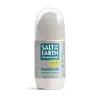What's inside
What's inside
 Key Ingredients
Key Ingredients

No key ingredients
 Benefits
Benefits

 Concerns
Concerns

No concerns
 Ingredients Side-by-side
Ingredients Side-by-side

Water
Skin ConditioningPotassium Alum
AstringentTriethyl Citrate
MaskingSodium Lactate
BufferingMagnesium Chloride
Aloe Barbadensis Leaf Juice Powder
Skin ConditioningRosmarinus Officinalis Leaf Extract
AntimicrobialHelianthus Annuus Seed Oil
EmollientDecyl Glucoside
CleansingXanthan Gum
EmulsifyingXylityl Sesquicaprylate
AntimicrobialMagnesium Hydroxide
AbsorbentMagnesium Carbonate Hydroxide
BufferingSodium Anisate
AntimicrobialPhytic Acid
Water, Potassium Alum, Triethyl Citrate, Sodium Lactate, Magnesium Chloride, Aloe Barbadensis Leaf Juice Powder, Rosmarinus Officinalis Leaf Extract, Helianthus Annuus Seed Oil, Decyl Glucoside, Xanthan Gum, Xylityl Sesquicaprylate, Magnesium Hydroxide, Magnesium Carbonate Hydroxide, Sodium Anisate, Phytic Acid
Ingredients Explained
These ingredients are found in both products.
Ingredients higher up in an ingredient list are typically present in a larger amount.
We don't have a description for Potassium Alum yet.
Water. It's the most common cosmetic ingredient of all. You'll usually see it at the top of ingredient lists, meaning that it makes up the largest part of the product.
So why is it so popular? Water most often acts as a solvent - this means that it helps dissolve other ingredients into the formulation.
You'll also recognize water as that liquid we all need to stay alive. If you see this, drink a glass of water. Stay hydrated!
Learn more about WaterXanthan gum is used as a stabilizer and thickener within cosmetic products. It helps give products a sticky, thick feeling - preventing them from being too runny.
On the technical side of things, xanthan gum is a polysaccharide - a combination consisting of multiple sugar molecules bonded together.
Xanthan gum is a pretty common and great ingredient. It is a natural, non-toxic, non-irritating ingredient that is also commonly used in food products.
Learn more about Xanthan Gum